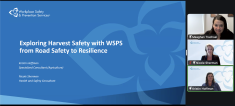New Brunswick residents who prepare foods in home kitchens for sale at public markets may soon catch a break on the licensing requirements other food vendors have to meet.
The provincial government last week posted proposed changes to its Food Premises Regulations that would lift the license requirements for such food sales.
Provincial Health Minister Madeleine Dube said Friday that public feedback showed licensing and inspection requirements to be "too demanding for not-for-profit events such as church suppers, for stands selling hard ice cream, and for people who prepare food in a home kitchen for sale at a public market."
Read Also

India slaps 30 per cent import duty on yellow peas
India has imposed a 30 per cent duty on yellow pea imports with a bill of lading date on or after Nov. 1, 2025.
The draft regulation, posted last week for a 30-day public comment period, proposes the removal of Class 1 and Class 2 food license categories, and to exempt stands selling hard ice cream and related toppings from licensing requirements.
Class 1 licenses currently apply to not-for-profit organizations that prepare food for events and to the preparation of non-hazardous foods — such as bread, fudge or cookies — for sale at a market. The Class 2 category currently applies to private residential kitchens where foods are prepared to be sold at a public market.
For the purposes of the rule, a "public market" would be a venue where a group of vendors sets up shop on a regular basis in a common location to sell food products, such as a farmers’ market or flea market.
"Might be required"
However, the province noted, "although the preparation of food in a private kitchen for sale at public markets would not require licensing, a license might still be required for the sale of potentially hazardous food items."
The draft posted online didn’t give any examples of what foods could be considered "potentially hazardous."
The proposed amendments would also provide licensing exemptions for single-day events such as a not-for-profit group’s church supper, or for individuals holding an event on behalf of a not-for-profit organization.
However, the province noted, the proposed changes won’t prevent the province’s public health officials from investigating complaints or issuing orders if a health hazard turns up.
The revised regulation, if approved, would take effect Jan. 15 next year.











